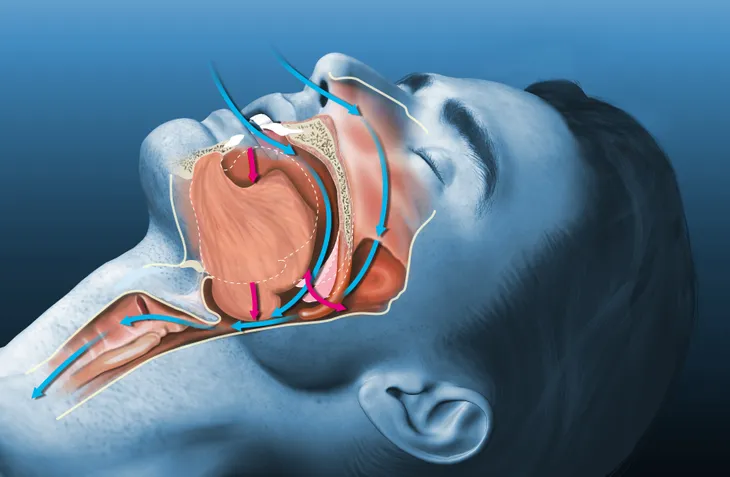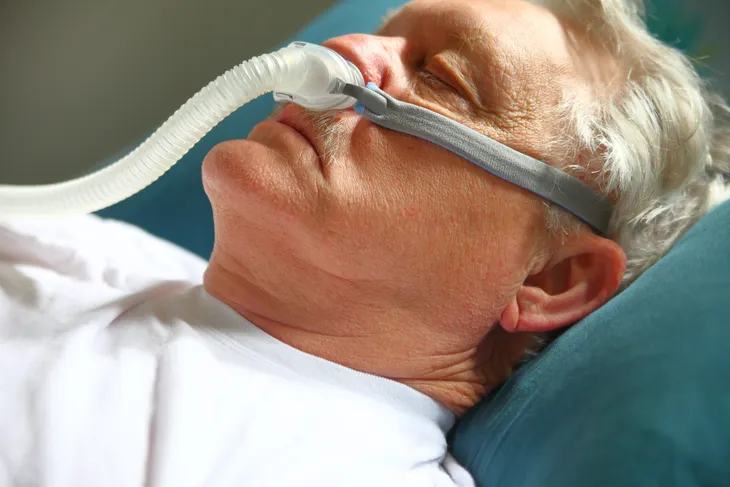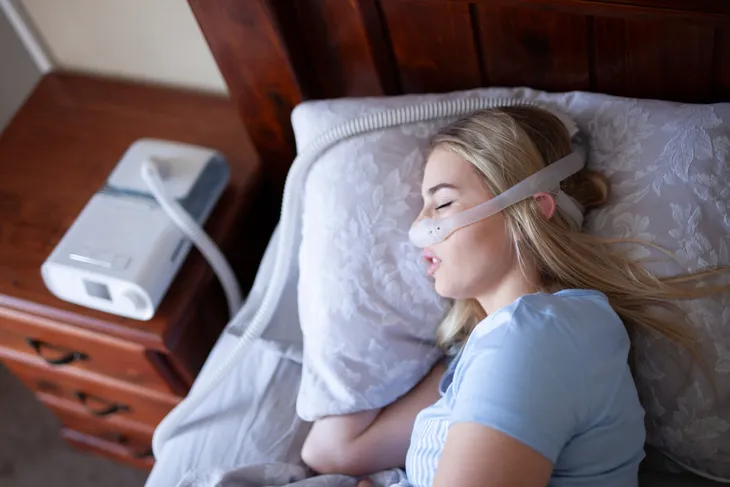- Snoring happens when air flows past relaxed muscle tissues and causes them to vibrate when you breathe.
- Although some snoring is benign, a few serious health conditions, such as obstructive sleep apnea, could be to blame.
- Treatment for snoring depends on the root cause and might include a CPAP machine, nose strips, or lifestyle changes.
- The outlook for someone with chronic snoring varies, depending on the reason behind it.
- You should see your doctor for any chronic snoring issues.
If you’ve been kept awake at night by someone’s loud snoring — or you’ve been the one keeping someone awake — you know exactly what snoring is. Or do you?
What is snoring, really, other than a loud noise, and why do some people snore while others don’t? Today we’ll answer all your most pressing questions about snoring, so you can (hopefully) find some relief from your snoring or that of another person.
What Is Snoring?
Snoring is a noise created when air flows past relaxed throat tissues, causing them to vibrate when you breathe. Although the sound appears to be coming from the nose, it actually originates in the throat. This is why you might notice people usually have their mouths open when snoring.
The sound may be loud or soft or even vary between the two throughout the night. Most people snore occasionally, but an estimated one in four people snore regularly.
Is Sleep Apnea Always to Blame for Snoring?
Obstructive sleep apnea is sometimes simply called sleep apnea or OSA. It’s a sleep disorder that causes irregular breathing and very loud snoring in an estimated 30 million Americans. However, doctors state only about 6 million sufferers have been diagnosed and started seeking treatment.
The irregular breathing in sleep apnea can cause other problems, so snoring isn’t always the only symptom. But while it’s often to blame for loud, chronic snoring, sleep apnea isn’t the sole cause. People snore for many reasons, with some being more common than others.
What Are Some Common Reasons People Snore?
Besides obstructive sleep apnea, using alcohol or sedative medications could also be to blame for snoring. However, this is generally only the case when those substances are used within the hours before bed.
People who smoke are more prone to snoring than those who don’t, with researchers believing it has to do with upper airway inflammation and edema. Also commonly to blame is sleeping on your back, as this position causes gravity to pull the tissues around your airway downward. Getting older or being overweight are other factors implicated in snoring.
What Are Some Less Common Reasons People Snore?
The size and shape of a person’s head, neck, and other anatomical structures can sometimes be to blame for snoring. For example, people with a deviated septum or nasal polyps are more likely to snore than others. A deviated septum occurs when the wall between the nostrils is bent instead of straight.
Acute (short-term) snoring can happen during viruses and other illnesses that cause sinus congestion because a stuffy nose can make breathing challenging. Acute or chronic allergies cause inflammation that makes breathing more difficult, thus leading to a higher chance of snoring. Hypothyroidism is another potential reason for loud snoring.
What Are Some Signs You Might Be Snoring at Night?
If you sleep with a partner or share your bedroom with another person, they may tell you about your snoring. However, if you don’t have anyone to tell you whether you snore at night, you can look for a few signs.
For starters, excessive daytime sleepiness and difficulty concentrating might suggest you snore as might waking up many mornings with a sore throat. Other signs to look for include high blood pressure, restless sleep, and chest pain at night.
Are Any Complications Associated With Snoring?
Most snoring is harmless, especially if it’s acute. However, chronic snoring can decrease your quality of life by causing fatigue, irritability, and an inability to concentrate throughout your day. Poor sleep quality is known to increase the risk of accidents, including falling and being involved in a car crash.
In rare cases, snoring can increase your risk of heart disease. This is generally only the case when your snoring is related to a serious condition, such as obstructive sleep apnea or hypothyroidism.
Is It Possible to Prevent Snoring?
Preventing snoring is possible in some instances. If your snoring is due to being overweight, losing weight might prevent snoring, and if you smoke, quitting may alleviate your snoring. Plus, quitting smoking and losing weight if you are obese have numerous other health benefits.
Other options for preventing snoring include avoiding alcohol and sedative medications. Visiting the doctor to determine the cause of your chronic snoring is one of the best options, as treatments can be prescribed to stop snoring.
What Can You Do at Home to Relieve Snoring?
Sleeping on your side may help you stop snoring. If you routinely roll from your side onto your back while sleeping or you don’t feel comfortable sleeping on your side, consider using a side sleeper pillow.
You can also buy nose strips over the counter, which help open up the nostrils. Raising the head of your bed slightly may also provide some relief, especially if allergies or viral infection causes your snoring. While some people can relieve snoring on their own, many need to visit the doctor to get more comprehensive treatment.
 Mouth tape strips for sleeping
Mouth tape strips for sleepingWhat Treatments Are Available for Snoring?
When snoring is caused by sleep apnea, using a continuous positive airway pressure (CPAP) machine is the most common treatment. This machine comes with a mask that covers your nose and mouth to provide enough continual air pressure to keep your airways open.
By keeping the airways open, a CPAP machine can prevent most snoring. Other treatments might include upper airway surgery, decongestants, positive lifestyle changes, and oral breathing devices, depending on the root cause of snoring.
How Is Snoring Diagnosed By a Doctor?
To obtain a snoring diagnosis, begin by seeing your primary doctor and describing your symptoms to them. If your partner says you snore at night, tell the doctor. They’ll do a physical examination and may order additional tests, such as blood work, imaging, or a sleep study.
They may also refer you to an ear, nose, and throat (ENT) specialist who will examine your throat and neck and the inside of your mouth. During the examination, they’ll look for irregular formations, polyps, and anything else that may cause your snoring.
Should You Get a Sleep Study Done for Snoring?
If your doctor suggests a sleep study, they want to rule out the potential of obstructive sleep apnea. Although undergoing a sleep study may be inconvenient because it takes all (or most) of a night, you should get one done if possible.
Sleep apnea can cause additional health problems, and treating the condition can lessen these risks. If you have concerns about getting a sleep study done, speak to your doctor, who can provide more detailed information.
When Should You See a Doctor for Snoring?
It may not be necessary to see a doctor if your snoring is caused by seasonal allergies or a virus, such as a cold or the flu. In these instances, snoring should stop once congestion goes away.
Likewise, snoring that happens only when you consume alcohol or sedatives should cease when you avoid those things. However, if you experience chronic snoring, see a doctor to rule out serious health conditions, such as obstructive sleep apnea or hypothyroidism.














